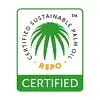
RSPO Independent Smallholder
The **RSPO Independent Smallholder (ISH) Standard** is designed to support independent smallholders in the sustainable production of palm oil. This standard aims to increase the inclusion of smallholders in the RSPO system by addressing their unique challenges and providing a phased approach to implementing sustainable practices.
### Key Features of the RSPO Independent Smallholder Standard
1. **Phased Approach**:
- The standard introduces a stepwise approach, allowing smallholders to gradually implement sustainable practices over a specified period. This helps them improve their farming methods and achieve full compliance with RSPO's sustainability criteria.
2. **Simplified Requirements**:
- The RSPO ISH Standard is tailored to the capacities and needs of smallholders, with simplified and straightforward requirements. This makes it easier for smallholders to understand and meet the standards without unnecessary complexity.
3. **Support and Incentives**:
- The standard provides access to tools, training, and resources that help smallholders improve their agricultural practices. It also includes incentives to encourage smallholders to adopt sustainable methods, such as higher yields and better market access.
4. **Principles and Criteria**:
- The standard is based on key principles and criteria that cover legal, economically viable, environmentally appropriate, and socially beneficial palm oil production. These include optimizing productivity, ensuring legality, respecting land rights, and protecting the environment.
5. **Local Interpretation**:
- The RSPO ISH Standard allows for local interpretation to address specific regional challenges and contexts. This ensures that the standard is relevant and applicable to smallholders in different countries and regions.
### Benefits of the RSPO Independent Smallholder Standard
- **Economic Viability**: Helps smallholders increase their yields and improve their livelihoods by adopting sustainable practices.
- **Environmental Protection**: Promotes environmentally friendly farming methods, reducing the impact of palm oil production on forests and biodiversity.
- **Social Responsibility**: Ensures fair treatment of workers and respects the rights of local communities and indigenous peoples.
- **Market Access**: Provides smallholders with access to international markets that demand sustainably produced palm oil, enhancing their economic opportunities.
### Conclusion
The RSPO Independent Smallholder Standard is a crucial tool for promoting sustainable palm oil production among small-scale farmers. By adhering to this standard, smallholders can improve their practices, gain access to new markets, and contribute to environmental and social sustainability.
About (RSPO Independent Smallholder)
The RSPO Independent Smallholder (ISH) Standard is designed to support independent smallholders in the sustainable production of palm oil. This standard aims to increase the inclusion of smallholders in the RSPO system by addressing their unique challenges and providing a phased approach to implementing sustainable practices.
Key Features of the RSPO Independent Smallholder Standard
-
Phased Approach:
- The standard introduces a stepwise approach, allowing smallholders to gradually implement sustainable practices over a specified period. This helps them improve their farming methods and achieve full compliance with RSPO's sustainability criteria.
-
Simplified Requirements:
- The RSPO ISH Standard is tailored to the capacities and needs of smallholders, with simplified and straightforward requirements. This makes it easier for smallholders to understand and meet the standards without unnecessary complexity.
-
Support and Incentives:
- The standard provides access to tools, training, and resources that help smallholders improve their agricultural practices. It also includes incentives to encourage smallholders to adopt sustainable methods, such as higher yields and better market access.
-
Principles and Criteria:
- The standard is based on key principles and criteria that cover legal, economically viable, environmentally appropriate, and socially beneficial palm oil production. These include optimizing productivity, ensuring legality, respecting land rights, and protecting the environment.
-
Local Interpretation:
- The RSPO ISH Standard allows for local interpretation to address specific regional challenges and contexts. This ensures that the standard is relevant and applicable to smallholders in different countries and regions.
Benefits of the RSPO Independent Smallholder Standard
- Economic Viability: Helps smallholders increase their yields and improve their livelihoods by adopting sustainable practices.
- Environmental Protection: Promotes environmentally friendly farming methods, reducing the impact of palm oil production on forests and biodiversity.
- Social Responsibility: Ensures fair treatment of workers and respects the rights of local communities and indigenous peoples.
- Market Access: Provides smallholders with access to international markets that demand sustainably produced palm oil, enhancing their economic opportunities.
Conclusion
The RSPO Independent Smallholder Standard is a crucial tool for promoting sustainable palm oil production among small-scale farmers. By adhering to this standard, smallholders can improve their practices, gain access to new markets, and contribute to environmental and social sustainability.